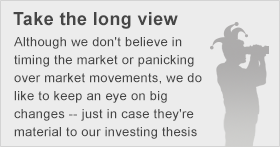
On the back of last week's losing performance in the market, U.S. stocks are slightly higher on Monday morning, with the benchmark S&P 500 and the narrower Dow Jones Industrial Average (^DJI +0.48%) up 0.23% and 0.08%, respectively, at 10:15 a.m. EDT. Nevertheless, we are still in a massive bull market and that has begun to fuel a mergers and acquisitions boom (companies, like most investors, are enthusiastic buyers when assets become more expensive). That trend is most visible in the health-care sector, with yet another deal announced over the weekend: Medtronic's (MDT 0.02%) $42.9 billion cash and stock offer for medical devices company Covidien (COV +0.00%).

Source: Diabetes Mine.
Medtronic is offering 0.956 of its own shares and $35.19 in cash for one Covidien share, valuing the latter at $95.22 -- a 29% premium to Friday's closing price. That control premium looks reasonable, given that Medtronic expects to realize $850 million in (pretax) cost synergies and that both Medtronic and Covidien shares looked roughly fairly valued prior to the deal announcement.
One aspect of the deal that is bound to attract some attention is that it would allow Medtronic to transfer its tax domicile to Ireland, Covidien's corporate headquarters, thereby lowering its tax rate in a process known as an "inversion."
Medtronic is minimizing the inversion feature as a rationale for the buyout: It is not mentioned in the deal press release or the PowerPoint presentation describing the transaction. As Omar Ishrak, chairman and CEO of Medtronic, told the Financial Times: "This transaction is strategic first; the financial structure and optimization of tax discussion came after. The tax rates for Medtronic do not change a significant amount, but the structure gives us access to the cash generated by Covidien assets abroad which we can then reinvest into US technologies."
Medtronic is wise to adopt this approach, for three reasons. First, with large companies having broader options and resources for tax avoidance than individuals, carrying out an inversion is politically sensitive. There is therefore little to be gained by trumpeting it from the rooftops. Second, I think we can take Ishrak at his word that the inversion is not the driving factor behind this deal (unlike Pfizer's failed bid for AstraZeneca, in which it appeared to play a critical role).
Finally, there is a chance that Congress will prohibit U.S. companies from completing an inversion, or at least make it much more restrictive. In fact, the budget the White House sent to Congress in March would all but eliminate inversions. As such, investors ought to assess the deal on its business merits -- as it should be. On that basis, the transaction looks like a win/win for both companies; note that Medtronic and Covidien shares are higher this morning.
